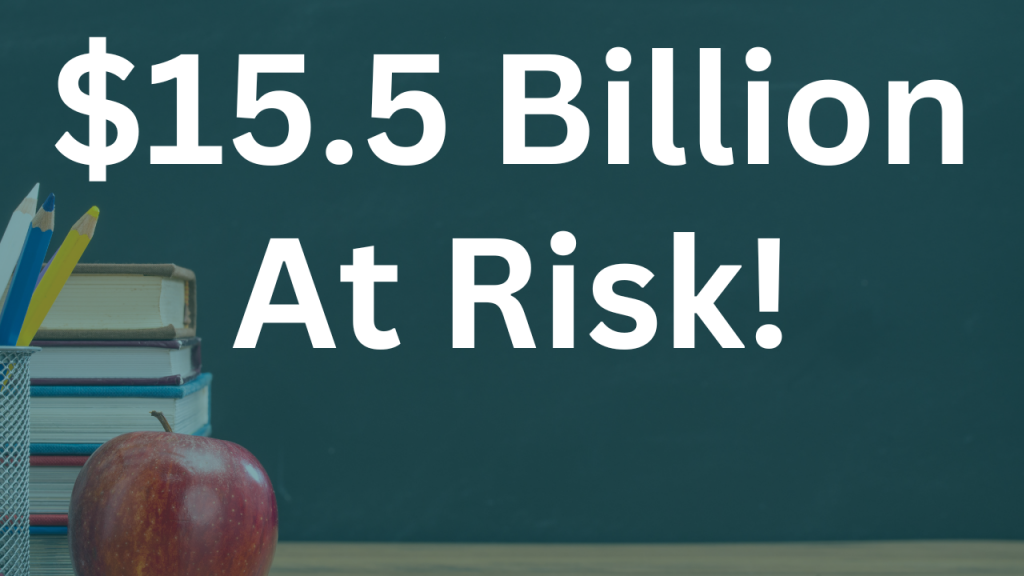Episode #137: The Future of Special Education: How IDEA Changes Will Impact Your Family
Episode #137: The Future of Special Education: How IDEA Changes Will Impact Your Family
The Water Prairie Chronicles Podcast airs new episodes every Friday!
Find the full directory at waterprairie.com/listen.
Show Notes:
Are schools failing to meet their IDEA obligations? I’m sharing the latest data and what you can do to protect your child’s education.
A major overhaul to special education funding and a landmark Supreme Court case—this episode is packed with the latest news parents of children with disabilities need to know.
Join host Tonya Wollum as she breaks down the proposed consolidation of IDEA funding and what it could mean for parent advocacy and specialized programs. We’ll also cover new data on state non-compliance with IDEA and the concerning effort to stop tracking racial disparities in special education. But it’s not all difficult news!
Tonya shares the recent Supreme Court win in A.J.T. v. Osseo, a landmark decision that strengthens the rights of students with epilepsy and similar health needs. Tune in to understand these critical changes and learn how you can stay proactive in your child’s IEP process.
Key Takeaways from Episode 137:
- Proposed IDEA Funding Overhaul: The Trump administration has proposed consolidating the $15.5 billion in IDEA funding into a single fund. This could potentially disrupt specialized programs and support services for children with disabilities, making parent advocacy more crucial than ever.
- Widespread IDEA Non-Compliance: New 2024 data from the Office of Special Education Programs reveals that most states have failed to meet their IDEA obligations for years. This highlights the importance of staying in close communication with your child’s school to ensure their IEP is being followed.
- Good News: The A.J.T. v. Osseo Supreme Court Ruling: A major victory for parent advocacy, this Supreme Court decision confirms that schools must provide individualized learning plans that meet a student’s specific needs, reinforcing the power of the IEP.
- Your Action Plan: With these changes and reports, it’s essential to be proactive. Actively participate in your child’s IEP or 504 team, stay connected with their teachers, and don’t hesitate to seek support from resources like an IEP coach. Your voice can make a significant difference in protecting your child’s education.
- Link to the promised video: 5 Ways to Improve Communication with Your Child’s Teacher: https://youtu.be/SSbJvyzrps4
Work with Tonya as an IEP Coach: If you’re looking for personalized support, a trusted partner, and expert guidance through the IEP process, I would be honored to be part of your team. Find more information about my IEP coaching services here: https://waterprairie.com/iepcoach
📰 Are you getting our newsletter? If not, subscribe at https://waterprairie.com/newsletter
👉 Support our podcast and help us share more incredible stories by making a donation at Buy Me A Coffee. Your contribution makes a significant impact in bringing these stories to light. Thank you for your support!
Music Used:
“LazyDay” by Audionautix is licensed under a Creative Commons Attribution 4.0 license. https://creativecommons.org/licenses/by/4.0/
Artist: http://audionautix.com/

Tonya Wollum is an IEP Coach, podcast host, and disability advocate. She works one-on-one with parents to guide them to a peaceful partnership with their child’s IEP team, and she provides virtual mentors for special needs parents through the interviews she presents as the host of the Water Prairie Chronicles podcast. Tonya knows firsthand how difficult it is to know how to support your special needs child, and she seeks to provide knowledge to parents and caregivers as well as to those who support a family living life with a disability. She’s doing her part to help create a more inclusive world where we can celebrate what makes each person unique!
Episode #137: The Future of Special Education: How IDEA Changes Will Impact Your Family
Are schools failing to meet their IDEA obligations? I’m sharing the latest data and what you can do to protect your child’s education.
(Recorded September 14, 2025)

Full Transcript of Episode 137:
Tonya: If your child has an IEP $15.5 billion in special education funding is on the line this year. Here’s what it could mean for your family.
Welcome to the Water Prairie Chronicles, the podcast for parents navigating special education, IEPs, and 504 plans. I’m your host, Tonya Wollum, and I’m glad you’re here.
The shocking news for this week, IDEA funding could face a major overhaul. Join me today to uncover the latest special education updates that impact your child’s IEP process and 504 plan. Let’s get started.
Since my last update in July, the Trump administration has proposed consolidating the funds used for special education. Changes that could have a big impact on parent advocacy efforts nationwide.
They plan to put the $15.5 billion for the Individuals with Disabilities Education Act, the IDEA, into one big pot for states to share. But education policy analysts and advocacy groups, such as the Council of Administrators of Special Education, have raised concerns about potential disruptions to specialized programs.
These worries stem from the risk of losing over $677 million of funding targeted for preschool grants, technical assistance, and parent centers, which could affect the support available for IEPs.
The proposed changes would consolidate all of these targeted funds into the larger Part B School-age program. These concerns are valid, but remember, Education Secretary McMahon told us back in June that there would be no cuts in IDEA funding, just simplification – though it may change how the money is used, it looks like that’s what we’re seeing happening with this funding.
The Office of Special Education Programs just released the 2024 data showing that most states have failed to meet IDEA obligations for years. This means your child’s IEP may not be followed as written. It’s more important than ever to stay in contact with your child’s school and be an active member of your child’s IEP team.
The Department also wants to stop tracking racial disparities in special education, which might hide inequities in how IEPs are offered. It’s a change that could affect fair access for some of our kids. I’ll watch this closely to keep you updated.
On September 5th, the House proposed steep education cuts for next year. They’re keeping IDEA funds the same for now, but less money overall might make it harder for schools to have the resources they need for special education. This could affect our students. Remember, our kids are still protected by IDEA law, but schools need support to follow it.
Before we move on to the good news that’s come out, please like, subscribe and share this video with another parent who’d benefit from seeing it.
Now here’s some good news. The Supreme Court ruled on A.J.T. v. Osseo in June. This case was about a girl named Ava who has epilepsy and needed evening school because her health needs prevent her from attending school in the morning.
Her school had denied this option, but the Supreme Court ruled that schools must help students like Ava with real learning plans. This was a big win for advocacy because it will help make sure IEPs work for individual student needs. I’ll share more as more information is released. So what should we do? These changes might make things tricky. For special education and the IEP process. I encourage you to connect with your child’s school to keep their IEP or 504 plan strong. Let’s work together to help keep our kids doing well.
These updates might feel overwhelming, but your voice can make a difference. I’m hopeful we’ll see good things ahead, and I’ll keep you posted on what happens next.
Here’s your question of the day. Have you communicated with your child’s teacher this year? Put your answer in the comments and if you haven’t connected with your child’s teacher and want some help doing so, stick around until the end.
I’ll link a short video with five ways to improve communication with your child’s teacher to help you stay on top of what’s happening during their school day. As an IEP coach, I’m here to support parents navigating special education and needing extra help with parent advocacy.
Check the show notes for my contact information if you’d like to chat about your child’s IEP, I’d love to assist you.
And the link for that video I promised you with five ways to improve communication with your child’s teacher can be found in the show notes. Be sure to check it out.
Thanks for watching. I’ll see you next time.
FAQ Section
Q1: What is the proposed change to IDEA funding?
A: The Trump administration has proposed consolidating the $15.5 billion for the Individuals with Disabilities Education Act (IDEA) into one large pot for states to share. This could affect funding for parent centers, technical assistance, and preschool grants.
Q2: How does this affect my child’s IEP?
A: The proposed changes could disrupt specialized programs and support services. It’s crucial for parents to stay active members of their child’s IEP team to ensure their plan is followed.
Q3: What was the Supreme Court case about?
A: The Supreme Court case of A.J.T. v. Osseo was a victory for a girl with epilepsy who needed evening school. The ruling affirmed that schools must create real, individualized learning plans that meet a student’s unique needs.
Q4: What is a 504 plan, and how is it different from an IEP?
A: A 504 plan is a document that outlines accommodations for a student with a disability so they can have the same access to education as their peers. It’s different from an IEP because it falls under Section 504 of the Rehabilitation Act, not IDEA, and it doesn’t provide special education services.
Q5: Where can I find the data showing states have failed to meet IDEA obligations?
A: The data is released by the Office of Special Education Programs (OSEP). You can typically find their annual reports and data on the Department of Education’s website. These reports provide a detailed look at how states are complying with IDEA.
Q6: How does the Department of Education’s plan to stop tracking racial disparities affect my child?
A: This change could potentially hide inequities in how special education services are provided. Tracking racial disparities is important because it can reveal if certain groups of children are being over- or under-identified for special education services, which can impact fair access and support.
Q7: What is the “Question of the Day” video you mentioned, and where can I find it?
A: The video provides five ways to improve communication with your child’s teacher. You can find the link to the video in the show notes and the description of this episode.
Q8: What is the significance of the A.J.T. v. Osseo Supreme Court case?
A: This case is a big win for advocacy because it reinforces that schools must provide real, individualized learning plans that account for a student’s unique needs. It sets a positive legal precedent for parents advocating for flexible and personalized educational solutions.
Q9: What is the key takeaway for parents from this news update?
A: The most important thing parents can do is to stay proactive. Connect with your child’s school and be an active member of their IEP or 504 team. Your voice and your advocacy are more important than ever to ensure your child’s needs are met despite these complex changes.
